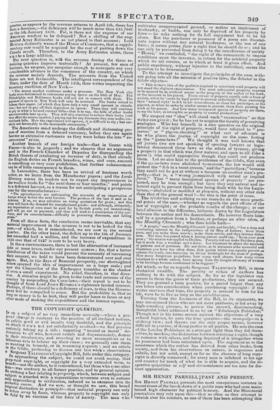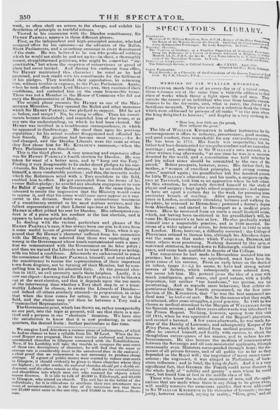SIR HENRY PARNELL PAST AND PRESENT.
SIR HENRY PARNELL presents the most conspicuous instance in recent times of the break-down of a public man who had once main- tained high character for political honesty. And the Ministerial journalists may rely upon this—that as otten as they attempt to varnish over his conduct, as one of them has been attempting this
week, so often shall we return to the charge, and exhibit his dereliction of principle in truthful colours. •
Viewed in his connexion with the Dundee constituency, Sir Ilesteat PARNELL appears in three different phases. First, as the independent and high-principled senator, who had resigned office for his opinions—as the advocate of the Ballot, Short Parliaments, and a searching economy in every department of the state. He was believed to be one who professed nothing which he would not abide by and act up to—in short, a thoroughly honest, straightforward politician, who might be somewhat " im- practicable," but whom the Nuspicion of subserviency or greed of' place had never tainted. And during his exclusion from office, Sir HENRY maintained this character : he voted as he had promised, and took credit with his constituents for the fulfilment it his pledges. They testified their approbation, by returning him, without trouble or expense, to the PEEL Parliament. Again, when he took office under Lord Mitten-earns, they continued their confidence, and reelected him on the same honourable terms. There was not a Member in the House of Commons who did not envy the Representative of Dundee. The second phase presents Sir HENRY as one of the MEL- BOURNE Ministers. They opposed the Ballot and other measures which Sir HENRY PARNELL was pledged to support. Did he act as before, and resign ? No, be clung to office. Then his consti- tuents became dissatisfied; and reminded him of the terms, or at any rate the understanding, on which he had been elected. Sir HENRY was involved in a troublesome correspondence, in which he appeared to disadvantage. He stood then upon his previous reputation ; for his actual conduct disappointed and offended his best friends. His position had become most uneasy,—for he had changed, and the Dundee Liberals were the same as when they first chose him for Mr. KINLOCH'S successor,—when the PEEL Parliament was dissolved.
This is the third phase. A very annoying and expensive affair was Sir HENRY PARNELL'S fourth election for Dundee. He was taken for want of a better man, and to " keep out the Tory." Finding it very disagreeable to lie under direct pledges to his con- stituents, Sir HENRY resolved to secure, as he no doubt flattered himself, a more comfortable position : and this, the necessity under which the Reformers acted with a Tory candidate in the field, enabled him to effect. He got extricated from the terms of his former Ballot-pledge; lie avoided any absolute engagement to vote far Ballot if opposed by the Government. At the same time, he laboured to create the impression that the Ministry would cease to oppose it, and that his name would once more appear as a sup. porter in the division. Such was the unhandsome treatment of a constituency entitled to his most zealous services, and the fullest representation of their Liberal opinions at his hands. Sir HENRY in effect jobbed his seat for Dundee. His subsequent con- duct is of a piece with his conduct at the last election, and it appears to have surprised nobody. In dealing with the various particulars and phases of Sir HENRY PARNELL'S case, it has always been our aim to derive from it some useful lesson of general application. Thus, when it ap- peared that Sir HENRY'S character suffered from his connexion with the Ministry, we inferred that there was something very wrong in the Government whose touch contaminated such a man :
first we remonstrated with the Government on its false policy ; and then we warned the Liberals not to trust a Ministry so acting, with too blind a confidence. Afterwards we endeavoured to rouse
the conscience of Sir HENRY PARNELL himself; and next advised the constituency to rescue the representation of their important
town from disgrace, not by turning off their Member, but by com-
pelling him to perform his admitted duty. At the general elec- tion in 1837, an evil necessity made them helpless. Lastly, it is now our object—knowing that Sir HENRY PARNELL Will be thrown
out at the next election, and that it depends upon the use made
of the intervening time whether a Tory shall step in or a trust- worthy Liberal be chosen, to awake the Liberals of Dundee—
and indeed all others similarly situated—to preparation, in order that when the time comes for action, fit men may be in the field, and the choice may not then be between a Tory and a "trammelled Representative." The Government print, which has drawn us, rather unexpectedly on our part, into the topic at present, will see that there is a me- thod and a purpose in our "obstinate' iteration. We have also the satisfaction to know that it is now producing, in several quarters, the desired fruits : further particulars in due time.



























 Previous page
Previous page